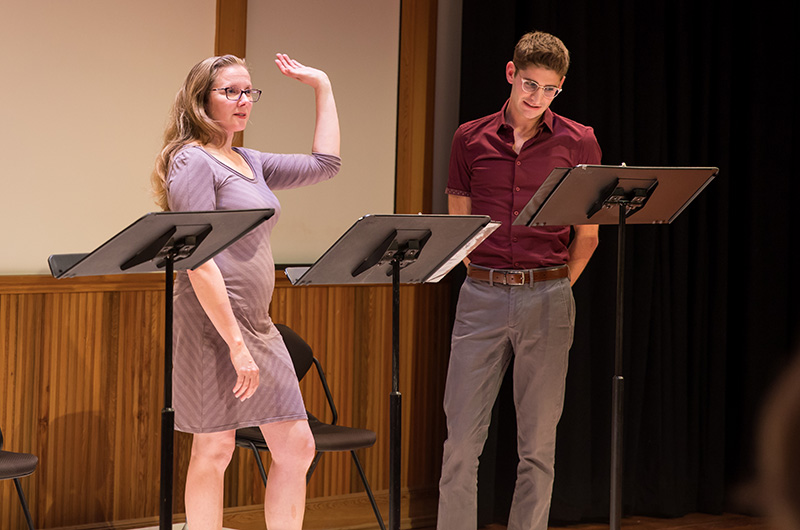In 1921, Sidney Joseph Perelman couldn’t wait to get out of Providence, the city Howard Phillips Lovecraft never wanted to leave.
The two young men couldn’t have been more different: Sid a 17-year-old wisecracker with a ticket to Brown and the dream of becoming a cartoonist; Howard a brooding dreamer who, at 31, never finished school, still lived with his family and wrote very strange stories.
Could their paths have crossed, that summer in Providence? Playwright Marc Kirkeby has imagined that they did. His new play Sid & Howard, which had a staged Monday Night Special reading at the Martha’s Vineyard Playhouse July 1, begins with a chance encounter between the two outside a Weybosset street movie house.
“It’s really real, this play, except for the parts that the playwright made up,” a narrator named J informs the audience.

Scott Barrow, who directed the reading, also performed as J, a 21st-century voice providing context with more than a dash of comedy. This play is not a mash-up of the 1980s movies Sid & Nancy and Melvin & Howard, J explains, adding with a shudder “Imagine the fingernails!”
It’s more like a comic book featuring two mismatched buddies: “Laffs and Scary,” J says. “They should be floating in separate jars. . . until one night a lunatic scientist dares to remove the lids.”
That’s evident from the moment they meet, after seeing the sensational new film The Four Horsemen of the Apocalypse. Sid is so enraptured with Rudolph Valentino’s dancing that he runs directly into Howard.

And why was Howard there? He was hoping to see a beast of the Apocalypse, along with the horsemen. Instead, emerging from the theatre he inexplicably finds himself in the arms of a young Jewish man—an instant affront to his purebred New England aloofness.
“Stop that! Stop, I say,” he commands the teenager. “You are a Jew.”
“I beg your pardon. I am The Jew,” responds brash Sid. And somehow, the two fall to talking—about everything from sexual attraction (“the basest of human instincts,” Howard says; Sid just wants to meet some girls) to college and Sid’s prospects as a Jew at Protestant, Ivy League Brown.
“You think I don’t know what to expect up there?” Sid asks. “All I know is that’s the way out of this.”
“This,” for Sid, is toiling on his parents’ chicken farm outside the city and working evenings at the What Cheer cigar shop, always with a book in hand.
Bookishness is one of several traits Sid and Howard share. They both attended Classical High School, though sickly Howard never graduated. He attended Brown, too—a day student, or “carpetbagger,” as Sid will be—but dropped out there as well. And neither of them has had anything to do with the opposite sex.
And while his first reaction to Sid was an instant wave of anti-Semitic revulsion, Howard has a secret to share: He has a female friend, and she is Jewish. She’s also visiting Providence with the expectation of meeting Howard’s evidently formidable Aunt Lillian, and Howard begs Sid to join them as a social lubricant.
Howard’s friend is Sonia Haft Greene, a fashion designer, retailer and writer from Brooklyn who will become his first and only wife in 1924. She and Sid exchange repartee, and Howard later takes Sid on a nocturnal tour of the Providence waterfront—a dark and sinister place where Howard muses on his murky visions while Sid, as usual, tries to keep things light.
The second part of the play sees Howard and Sonia, married but far from happy, in Brooklyn, where a nattily dressed Sid pays a visit after graduating from Brown and getting his first magazine job. Without giving away the ending, an H.P. Lovecraft line J quotes at the beginning of the play is apposite: “From even the greatest horrors, irony is seldom absent.”
Mr. Kirkeby, the playwright, took the stage after the reading to answer questions from the audience, moderated by playhouse literary manager Jenny Allen. A Brown alumnus himself, Mr. Kirkeby said he’s struck by the way the two writers, H.P. Lovecraft and S.J. Perelman, are remembered—or not remembered—today.
While in 1921, Lovecraft was publishing his work in magazines and attending conventions with other amateur writers like Mrs. Greene, Perelman was a teenaged would-be cartoonist. But their careers would be headed in opposite directions for the next few decades.
“If, somehow, a version of this play had been done in 1960, everybody in the room would have known S.J. Perelman,” the celebrated wit, New Yorker magazine contributor and screenwriter who had recently shared an Academy Award for Around the World in 80 Days, Mr. Kirkeby said.
At the same time, nothing by Lovecraft remained in print. “I think he was totally forgotten,” Mr. Kirkeby said.
But by the 1970s, Lovecraft was enjoying a comeback as his works found new readers.
“The science fiction audience is a very loyal audience. They have taken him up,” Mr. Kirkeby said. “There’s even a Library of America edition of Lovecraft’s collected works.”
And Perelman? Just a handful of anthologies remain in print, with his earliest and best work considered rare and collectible.
At the staged reading, Sid was played by Stephan Amenta, who also appears in the upcoming main stage production of Christopher Durang’s Vanya and Sonia and Masha and Spike, opening July 13.
Marc Carver played Howard and Molly Purves was Sonia. In addition to directing and playing the narrator J, Mr. Barrow also appeared as a quizzical Irish policeman and a supercilious waiter, provided the meowing of waterfront cats and represented the large, slimy, tentacled beast that—despite Howard’s visions—only Sid can see.
The next Monday Night Special at the playhouse, July 22, is The Broken Closet, a drama by Maggie McDonald Condon.
On the main stage, Sarah Ruhl’s Dear Elizabeth closes July 6. The lobby art space is showing an exhibit by Kate Feiffer called Dedicated to Doodle. For more information and to reserve tickets for shows, visit mvplayhouse.org.




Comments
Comment policy »